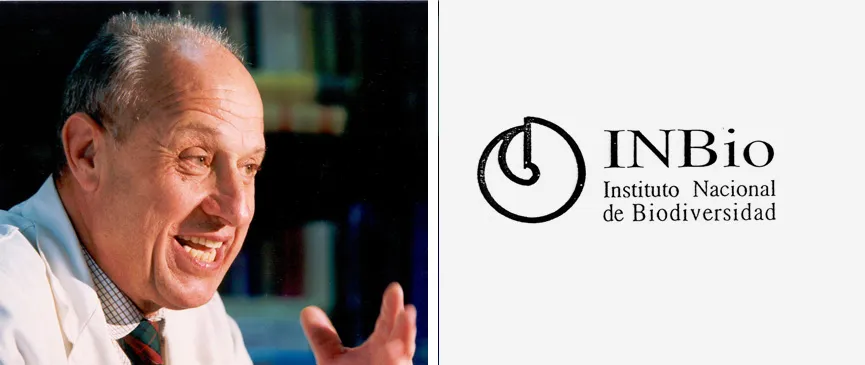Main content
Manuel Losada Villasante and National Biodiversity Institute of Costa Rica Prince of Asturias Award for Technical & Scientific Research 1995

Professor Losada has carried out pioneering research on he photosynthetic assimilation of nitrogen. Institute of Biodiversity of Costa Rica created to carry out scientific studies into species and their diversity.
Manuel Losada Villasante (Carmona, Seville, Spain, 1929 –) obtained a Degree in Pharmacy from the Complutense University of Madrid, where he subsequently earned his PhD. A disciple of Severo Ochoa, he later worked at the University of Münster and the University of California at Berkeley during the 1950s. Before being appointed Professor of Biochemistry at the University of Seville, he was head of the Institute of Cellular Biology for three years at the Spanish National Research Council (CSIC), where he held other positions of responsibility. His research interests focused on photosynthesis and other biochemical energy conversion systems. He has supervised more than fifty PhD theses, created an advanced school of research and published more than two hundred scientific papers and reviews on these topics, as well as several books, including Potenciometría y Bioenergética, Fotobioquímica and Los Elementos y Moléculas de la Vida. His hometown, Carmona, named a secondary school after him in 1999. He also has a street named after him in the city of Seville (Calle del Dr. Losada Villasante). Now retired, he dedicates his time to publishing research, religious and scientific articles.
Awarded honorary degrees by the Universities of Zaragoza and Córdoba, in 2006 he received the Medal of the University of Seville. He was named “Favourite Son of Andalusia” (1993) and holds the Rey Jaime I Research Prize (1990) and the Maimonides Scientific and Technical Research Prize from the Junta de Andalucía (1988). He held Medal No. 3 at the Spanish Royal Academy of Exact, Physical and Natural Sciences and became a supernumerary member in 1980. Honorary member of the Spanish Royal Academy of Pharmacy, he is an honorary member of the Spanish Society of Plant Physiology and of the Spanish Society of Biochemistry and Molecular Biology.
The National Biodiversity Institute of Costa Rica (INBio) is a scientific institution with social orientation. It is non-profit and for the public good. Our mission is to promote a new awareness of the value of biodiversity, and thereby achieve its conservation and use to improve the quality of life.
INBio generates knowledge about biodiversity. It communicates and promotes this information in many formats designed to be responsive to a broad spectrum of national and international users.
Our activities support the spiritual, social and economic development of Costa Rican society in equilibrium with the environment.
We realize our mission through:
- Biodiversity inventory, with emphasis on our national protected areas
Search for sustainable uses of biodiversity by any and all social sectors, and promotion of these uses - Organization and administration of biodiversity information
- Transfer and dissemination of biodiversity knowledge
These processes are carried out with a humanitarian vision. Our style is to be innovative, organized, participatory and multidisciplinary. We extend our influence and effectiveness and through strategic alliances with various national and international sectors.
End of main content
